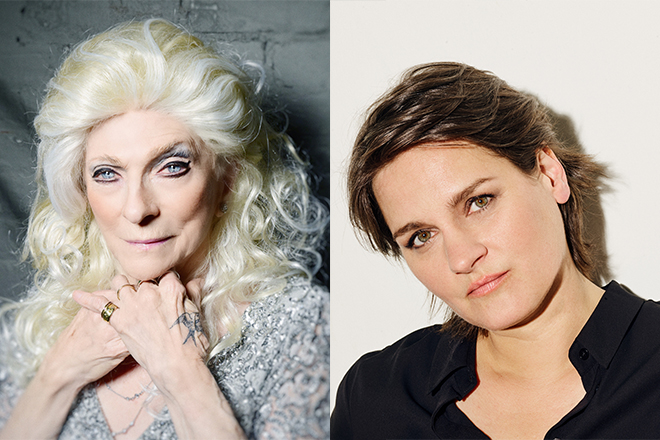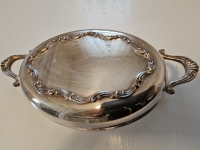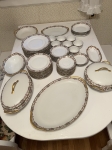Judy Collins and Madeleine Peyroux
Folk and jazz icons share the stage for an unforgettable double bill of songs and stories. Judy Collins has thrilled audiences with her unique blend of interpretive folk songs, sublime vocals and bold songwriting for six decades. Madeleine Peyroux has become one of the most acclaimed jazz singers of her generation since arriving on the scene in 1996.
Judy Collins
In her 50-plus years in music, Judy Collins has always exhibited impeccable taste in songcraft. On her landmark 1967 album, Wildflowers, she curated a stunning collection featuring originals alongside songs by not-yet household names such as Joni Mitchell and Leonard Cohen, and adventurous selections by Jacques Brel and Francesco Landini. Her discerning palette, and her literary gifts, have enabled her to evolve into a poetic, storyteller songwriter. Now, in her 6th decade as a singer and songwriter, Judy is experiencing a profound level of growth and prolific creativity.
The cultural treasure’s 55th release, Spellbound, out February 25, 2022, finds Judy enjoying an artistic renaissance. The 13 song album is a special entry in her oeuvre. It marks the first time ever she wrote all the songs on one of her albums. It features 12 new recently-written modern folk songs, and a bonus track of her evergreen, “The Blizzard.” Spellbound is an introspective and impressionistic album. It unfolds as if Judy curated a museum exhibit of her life, and welcomed us into a retrospective of her most formative moments, some big and public, and some intensely personal and intimate.
“They say after the plague came the Renaissance,” Judy says with a good-natured laugh, loosely referencing the pandemic. “The truth is, I didn’t do an album like this sooner because I had other projects on my mind. This album was necessary for me to keep creative—it was the next piece of the puzzle.” She continues: “Now felt like the perfect time to make this record because, after all that’s happened in the world, we need something beautiful and inspirational to lift us up.”
In Judy’s eloquently written liner notes, she dedicates Spellbound to folk masters Pete Seeger and Woody Guthrie. On the album, she furthers their traditions of generously sharing their lives, loves, and personal reflection. Also, in her notes, Judy relates the origins of her songwriting—a story some know, and a testament to how gloriously unpredictable art and the muse are. Story goes that in 1966 Leonard Cohen made a special trip to Judy’s apartment to play her his song, “Suzanne,” and, while there, asked her why she wasn’t writing her own songs. Her response was to sit down at her Steinway that very day and write, “Since You’ve Asked.” Judy has been writing ever since then.
A lifetime and 54 years of songwriting elegantly come forth from Spellbound. The album revisits the thrilling 1960s Greenwich Village years; recreates breathtaking moments in the wilds of Colorado during Judy’s childhood; snapshots her hellraising years; and frames quiet moments of nature from just a few years back. The title references a formative time in Judy’s life when her pure love of the outdoors lured her close to becoming a park ranger. Lyrically, the songs are impressionistic and evocatively emotional. “I strove to capture what I see with lyrics, and bring particular times to life,” she says of the album’s painterly and personal songwriting.
While she celebrates many passages in life with her lyrics, her vocals sound untouched by time. Judy’s singing on Spellbound shines pristinely as she eases from warm low-register vocals to soaring high tones, as if no time has elapsed since her singing mesmerized a generation on Wildflowers. “That’s a combination of good fortune, extreme luck, and hard work and discipline,” she reveals. “I do a lot to protect and take care of my voice, and I practice every day—you have to or you lose it.”
The majestical track, “So Alive,” is an exhilarating time capsule of a song that documents the dazzling excitement and possibility of 1960s folk boom in Greenwich Village. “So Alive” establishes the album’s sublimely detailed production aesthetic which features a palette of acoustic guitar, textured electric guitar, piano, keys, lyrical bass lines, brushed drums, and Judy’s angelic vocals. The sweetly nostalgic, “When I was a Girl in Colorado,” pines for those pre-fame years when Judy’s life centered around seasonal outdoor joys.
Judy’s flair for literature, poetry, and her commitment to social activism shine forth on the stirring “Thomas Merton.” Merton was an author and a monk who spent most of his adult life in a monastery around Louisville, Kentucky. He was also a potent force in the anti-war movement, and there have been theories that his death was a murder. Judy addresses this juicy possibility with engrossing storytelling and poetic phrases. One potent passage reads: He dreamed of being an eagle with wings he would fly/from the west and north and the east/Thru rain and sleet and wind and snow/He’d find a way to bring us peace/Long after he was buried/Upon his death concealed/The evidence of bullet holes finally was revealed. The smoldering ballad, “Arizona,” showcases Judy’s achingly beautiful vocal floating over a piano ballad lavished with ethereal ambience and layers of heavenly harmony vocals.
In the studio Judy worked with a trusted family of musicians, including co-producer Alan Silverman and singer-songwriter-guitarist Ari Hest. Ari has worked closely with Judy for years, and, in 2016, Judy and Ari were nominated for a “Best Of Folk Album” Grammy for their duet album, Silver Skies Blue. In the studio the core group of musicians on the album are multi-instrumentalist Thad DeBrock (Duncan Sheik, Nelly, Jonas Brothers), bassist Zev Katz (Marc Anthony, Elton John, Billy Joel), and drummer Doug Yowell (Suzanne Vega, Joe Jackson, Duncan Sheik) – additional musicians on album are detailed within the album’s liner notes.
In a life and a career brimming with milestone moments, Spellbound is a high watermark of artistry and personal evolution. Though Judy has been writing for half a century, her new album ushers in an era of unbridled creativity. “I always knew I was going to be a late bloomer,” she says, cracking up with laughter.
MADELEINE PEYROUX
Craft Recordings announces the deluxe reissue of Madeleine Peyroux’s best-selling 2004 album, Careless Love. The expanded reissue will be available digitally and on 2-CD on August 27th, with a triple-gatefold 180-gram 3-LP edition following on September 17, all formats available to pre-order now. The collection includes the acclaimed, original album, plus a previously unreleased live set, captured in its entirety in 2005 at Spain’s Festival de Jazz de Vitoria-Gasteiz. Both physical editions include recently unearthed photos, captured during Careless Love’s original release, plus new liner notes from the GRAMMY® Award-winning journalist Ashley Kahn, who recently spoke to Peyroux about the making of the album and her triumphant performance in Spain. In addition to the widely available standard 3-LP edition, a limited pressing on translucent vinyl with black and gold marble will be available exclusively via the official Madeleine Peyroux or Craft Recordings webstores (1,000 available worldwide). Fans can get a first listen with the advance singles, “Don’t Wait Too Long (Live),” “I Hear Music (Live)” and “Dance Me to the End of Love (Live),” all available now (stream/download here).
To celebrate the reissue, Madeleine Peyroux is scheduled to return to the road on an extensive Careless Love Forever world tour, kicking off September 3 at the Shenandoah Valley Music Festival in Orkney Springs, VA. The tour will find Peyroux playing classic material from Careless Love, in addition to songs from her wider catalog, with dates to continue through August 2022. Visit MadeleinePeyroux.com for ticket information.
Released eight years after her debut, Careless Love marked a new chapter for the then-30-year-old Peyroux. Born in Athens, GA to bohemian parents, Peyroux spent her teenage years in Paris, where she found herself entranced by the city’s busking musicians. By 15, the precocious singer was performing alongside them in the city’s Latin Quarter and soon dropped out of high school to tour Europe full-time. When she returned to the States in her 20s, Peyroux settled in New York, where she was discovered —and promptly signed—by Atlantic Records’ Yves Beauvais, who co-produced her 1996 debut, Dreamland.
Immediately, Peyroux caught the attention of the music world, drawing comparisons to one of the greatest jazz vocalists in history, Billie Holiday. Yet, amid a whirlwind of buzz and critical acclaim, the young artist withdrew from the spotlight.
“When I came back to New York to make that first album I was like a deer in the headlights,” Peyroux tells Kahn. “It was my first time in a studio, my first time back in America. Then 9/11 happened. Then George W. got re-elected. It was like the world was going crazy. After Dreamland I had signed with Sony and I was trying to make my second record. I was broke and I didn’t know what I was going to do next.”
In addition to undergoing vocal cord surgery, the young artist entered a period of exploration—one in which she literally and figuratively found her voice. She set out across America to reconnect with her home country, but she also spent a lot of that time in self-reflection. “I put a lot of thought into what my career means,” Peyroux recalls, “what making a record and the follow-up tour represents—the kind of music I wanted to do and the amount of work that is involved.”
By 2004, she was ready to return to the studio. Peyroux signed a contract with Rounder Records and was introduced to Larry Klein (Joni Mitchell, Herbie Hancock, Shawn Colvin), a legendary producer with whom she would form a long-lasting creative partnership. Klein’s sonically diverse background would also prove to be the perfect match for the singer-songwriter.
While Peyroux was introduced as a jazz artist, her influences spanned far beyond one genre—and the compositions selected for Careless Love showcased this versatility. From inspired interpretations of songs by Elliot Smith (“Between the Bars”), Leonard Cohen (“Dance Me to the End of Love”), and Hank Williams (“Weary Blues”), to more traditional fare made famous by Bessie Smith (“Don’t Cry Baby”), Billie Holiday (“No More,” “I’ll Look Around”), and Josephine Baker (“J’ai Deux Amours”), Careless Love offered something for every music fan.





